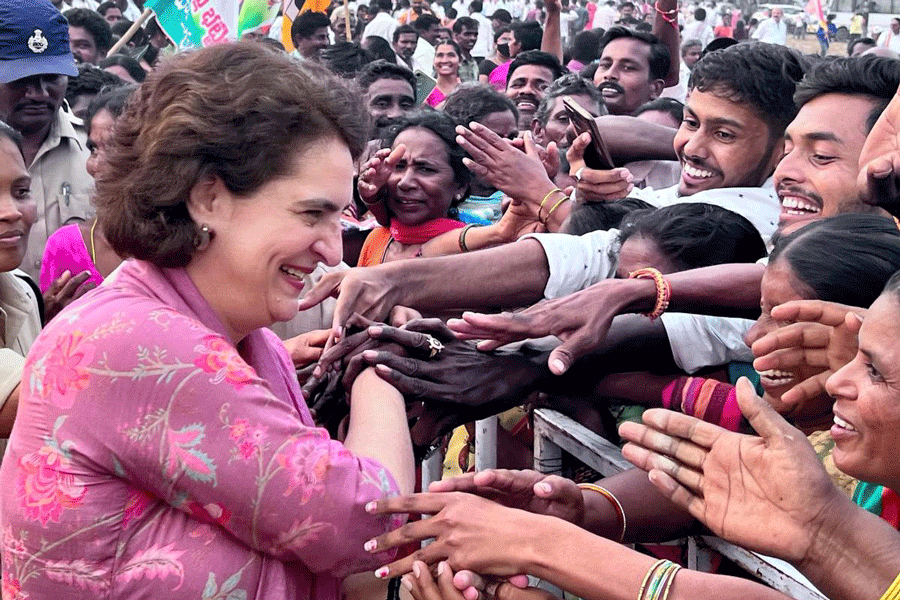The Congress has heavily relied on livelihood issues in this round of Assembly elections both in the states where they are in power and where they challenge the BJP, betraying a presumption that economic distress of the people can override the BJP’s majoritarian politics.
While their campaign in Rajasthan and Chhattisgarh was powered by welfare schemes and newer guarantees, they confronted the incumbent governments in Madhya Pradesh and Telangana with a robust pro-poor financial package woven around the social security theme. They steadfastly stuck to education, jobs, prices and agrarian distress even as Prime Minister Narendra Modi and home minister Amit Shah tried to drag them into their battlefield of identity politics.
Though Rahul Gandhi laid exceptional emphasis on caste census, the narrative was woven around the cause of social justice, instead of caste-based mobilisation. Though Mallikarjun Kharge countered Modi-Shah on historical facts, Priyanka Gandhi strictly kept the focus on awakening the voters, ceaselessly explaining to them that their vote should be cast for their core interests instead of diversions triggered by irrelevant emotive issues.
The change in the Congress strategy — first manifested in the Karnataka election — was obvious. It neither stepped into the quagmire of secular-communal debate nor tried to corner the BJP on its communal tactics. Insisting that the majority of people are religious in India but religion should not be dragged into politics, all the Congress leaders appealed to the voters to think about education, healthcare, jobs and prices.
The outcome of these elections will be a referendum on the efficacy of this clinical approach to elections, which avoids emotional issues and political questions to strictly engage with the voters on making their lives easier. Giving cash assistance to women, cheaper gas cylinders and free bus travel, apart from laptops to students and health insurance look alluring but is that strategy effective enough to dilute the effects of majoritarian politics?
Many people, however, stepping out of polling booths in Rajasthan on Saturday said they voted for the protection of “Sanatan dharma”, giving credence to the inexplicable “Hindu khatre mein hai” narrative. This shows Prime Minister Narendra Modi succeeded in polarising voters on religious lines by harping on issues like the murder of a tailor by two Muslim criminals and creating an impression that Hindus were not able to freely celebrate their festivals in Rajasthan.
While Congress supporters talked about the health scheme and guarantees of the Ashok Gehlot government, the BJP supporters primarily dwelt on the need for Hindu dominance. Asked about Modi’s achievements, they vaguely referred to India’s rising stature in the world, the removal of Article 370 and the construction of the Ram temple in Ayodhya. Modi has swiftly aligned with this sentiment, using these issues as evidence that he delivered on his promises.
Even on Saturday, addressing a rally in Kamareddy in Telangana, he said: “People have seen my track record in national politics. We deliver on our promises. Modi’s guarantees mean the guarantee of fulfilment of promises. We removed Article 370, scrapped triple talaq, passed the women’s reservation bill, gave one-rank-one-pay to servicemen and built the Ram temple in Ayodhya. In the context of Telangana, too, he said the Turmeric Board and the Central Tribal University that the BJP promised were done.
Modi was known for the alluring promise of “achhe din”, which included Rs 15 lakh
in every account, two crore jobs, women’s safety, controlling prices and doubling farmers’ income. Modi doesn’t talk about them anymore. Even his claims on Turmeric Board and Central University are misleading. While the promises were lying unfulfilled for all these years, the central tribal university for Telangana was sanctioned by the Union cabinet only last month, the foundation stone was laid for the university in Andhra Pradesh a few months ago. Even the Turmeric Board has been cleared only on paper.
Addressing a meeting in Telangana on Saturday, Priyanka said accountability is a sacred principle in politics and governance but politicians these days forget their promises after the election. Arguing that the foundation of our political tradition was laid by Mahatma Gandhi, for whom morality was always above anything else, Priyanka said all the Prime Ministers — Jawaharlal Nehru to Manmohan Singh — valued the principle of accountability.
She said leaders now forget that people are supreme in democracy and remember them only during election time while remaining obsessed with enriching their corporate friends all the time. “Neta ki neeyat kya hai, sabse bada sawal hai. Andar kya hai (what’s the intent of the leader, what’s the hidden agenda. What lies within, is the real question)” she said.
December 3, apart from delivering governments to five states, will answer whether political morality still has any relevance in this age of deception and demagoguery.











